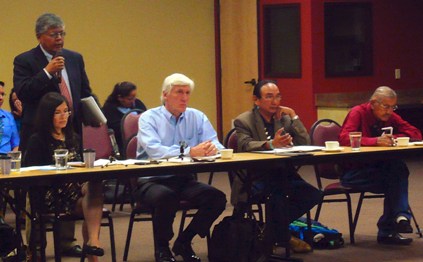 After 30 years of seeking support and adoption of the UN Declaration on the Rights of Indigenous Peoples, our efforts now focus on implementation. The Center has launched a series of sessions to brief tribal leaders on the content and value of the Declaration and the ways it can be used to correct current injustices. As noted by Center Executive Director, Robert “Tim” Coulter, “the briefing sessions and the partnerships that grow out of them are key to transforming the Declaration from a statement of aspirations to binding and enforceable domestic laws that will have real meaning for tribes and Native people.”
After 30 years of seeking support and adoption of the UN Declaration on the Rights of Indigenous Peoples, our efforts now focus on implementation. The Center has launched a series of sessions to brief tribal leaders on the content and value of the Declaration and the ways it can be used to correct current injustices. As noted by Center Executive Director, Robert “Tim” Coulter, “the briefing sessions and the partnerships that grow out of them are key to transforming the Declaration from a statement of aspirations to binding and enforceable domestic laws that will have real meaning for tribes and Native people.”
On June 6, 2012, the Center joined the Navajo Nation in providing a day-long briefing session to Southwestern tribal leaders at the Indian Pueblo Cultural Center in Albuquerque, New Mexico. Tribal leaders were invited from Nevada, Utah, Colorado, Arizona, New Mexico and Texas. Thirty people attended the briefing session, including tribal leaders from the Tohono O’odham Nation, the Yavapai-Apache Nation, the Jicarilla Apache Nation, and the Navajo Nation.
The Center has provided a number of briefing sessions for leaders of Native nations in the Dakotas, the Pacific Northwest, and Central California. The sessions are led by legal experts on the UN Declaration, who focus on the Declaration’s value as a powerful legal tool and how it can be applied to work for change in the United States. The briefing sessions provide an overview of the specific rights recognized in the UN Declaration—such as land and resource rights, treaty rights, self-determination, rights to culture, education, and traditional medicine—and provide insights on what tribes are doing to implement the Declaration. Most importantly, the sessions encourage tribal leaders to work quickly to take full advantage of the opportunity for implementation before it disappears.
Over the past year, many tribal leaders have indicated that the time is right to begin a major national campaign to make needed changes in federal policy and law. They are very eager to join with others to take advantage of the Administration’s willingness to consult with Native nations and consider changes in light of the UN Declaration. This is a remarkable opportunity for Native leaders to propose serious legal reforms and advocate for changes that will enable tribes to overcome the adverse policies and legal disabilities and give them opportunities they have been denied. Through our trainings, we expect to identify additional tribal leaders who will join this effort to create a national agenda for change based on the rights recognized in the Declaration.
The Albuquerque session was conducted by Center staff, led by Coulter. Tim helped bring the Declaration into reality when he assisted the Haudenosaunee in writing the first draft of the Declaration submitted to the UN in 1977, and he has spent more than 30 years working to secure its adoption. He knows every detail of the Declaration and how it can be applied to work for positive change in U.S. laws and policies for the benefit of Native nations.
The afternoon presentations were led by Rex Lee Jim, Vice President of the Navajo Nation, and Leonard Gorman, Executive Director of the Navajo Nation Human Rights Commission. Vice President Jim was one of the tribal leaders heavily involved in the negotiations and advocacy on the Declaration at the United Nations. Mr. Gorman was also involved in negotiating the Declaration, and continues to be engaged with advocacy before the UN regarding the San Francisco Peaks matter. The Vice President and Mr. Gorman highlighted what the Navajo Nation is doing to implement the Declaration and protect the human rights of tribal members both on the Navajo Nation and in the surrounding communities. For example, the Navajo Nation has passed a Sovereignty and Education Act that implements a number of the education, language, and culture articles of the Declaration. Likewise, the Human Rights Commission is working to ensure that the Navajo vote is not diluted in voter redistricting in New Mexico and Arizona. This ensures that the Navajo people will be able to meaningfully participate in the political life of the State—a right recognized by Article 5 of the Declaration.
A few days later, Center staff and Mr. Gorman gave presentations to Navajo Nation Bar Association members at the Association’s 2012 Annual Conference at the Pueblo of Isleta.
The Center is in the process of planning for briefing sessions with the United South and Eastern Tribes, the Affiliated Tribes of Northwest Indians, Southern California tribes, and Great Plains tribes.
